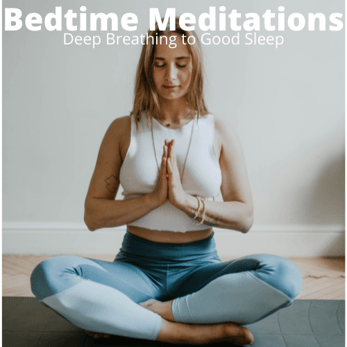
What's the first thing that comes to mind when you think about meditation? Is it a bunch of people sitting in a room saying "ommmm" together? Or is it a room full of Monks sitting in silence for hours on end? Whatever your mental image of meditation is, make sure to add bedtime meditation to it. Bedtime meditation is a wonderful way to help you get a good night's sleep. Keep reading to find out more about it.
What is meditation?
Meditation is an ancient practice that helps the mind focus on one thing. Meditation is like an exercise for your brain, making it stronger so it's able to maintain it's mental position for longer than normal. We are used to running a million miles a minute, that the idea of stopping and sitting still may seem impossible. That is where meditation comes it.
Meditation trains your mind to be able to focus on one thing for longer and longer periods of time. The longer you practice, the better you'll be at it. There are different types of meditations, to be discussed below, which will have you focus on different things. However, before bed, it's best to focus on letting the day go and settling your mind to get ready to go to bed.
What are the different types of Bedtime Meditation?
Bedtime meditation has different options so you can choose the one that best suits you. Below are a list of different meditations that you can try and find one that fits best for you!
Mindfulness meditation
Mindfulness meditation combines mindfulness and meditation. Meditation is the practice of concentrating your mind and taking time for yourself. Mindfulness is the process of staying in the moment and practicing being aware of your body. Your body awareness is supposed to take place without judgement, and consists of you taking inventory about yourself and focusing on the now. When you focus on the now, you can tune out everything else, helping you appreciate the now.
Mindfulness meditation consists of taking time to sit still and focus on all of your senses. What do you hear, feel, taste, smell, and see. If you choose to close your eyes, then you can enhance all of the other senses, taking inventory of what you're experiencing in the present moment. It slows life down for you so you can learn to deal with what may be causing you stress.
Body scan
A body scan is another type of meditation in which you take inventory of what you're feeling. However, this type of meditation involves focusing specifically on different parts of your body. To do a body scan, start at the feet and think about how they feel. If there is any tension, focus on it as you breathe in and release it as you breathe out. Do this continuously as you work your way up to your head.
Guided meditation
Guided meditations are meditations where someone is guiding you. It can be hard to meditate on your own. There are so many distractions, that it may be near impossible. However, with guided meditation, you have a voice to listen to and concentrate on as they guide you through what they want you to focus on. There are even guided meditations for specific events like going to bed, reducing anxiety, or dealing with any of life's other stressors.
Concentration meditation
Concentration meditation is similar to mindfulness meditation in the sense that you focus on what's present. However, with concentration meditation, you learn to focus on something in front of you and hold that focus. Whenever your mind wanders, you bring it back to that object and continue focusing on it. Eventually, your mind will get used to focusing on that object, and will help improve your concentration. Before bed, this could be something in your room or thinking about something that gives you peace. Whatever works to calm you down before bed.
Benefits of Bedtime Meditation
Meditation before bed can have many benefits. First, bedtime meditation can help with certain physiologic processes that are similar to sleep. For example, meditation can help increase melatonin, decrease heart pressure, and mimic the early stages of sleep.
Meditation can also help with your body's stress response to help reduce the amount of anxiety and worry you may feel. Meditation can also help to regulate your autonomic system which can influence your sleep-wake patterns. It has also been shown that meditation can help increase serotonin (which is a precursor to melatonin) and activate certain parts of the brain that control sleep.
Meditation is a great tool to use before bed to help you get deeper sleep. If you have tried meditation, but still have trouble going to sleep, then it may be worth your while to take a free online sleep test and work with our centers to determine if your sleep problems go beyond needing to relax.
[Sources]:
https://www.verywellmind.com/body-scan-meditation-why-and-how-3144782
https://www.verywellmind.com/best-guided-meditations-4843806
https://oneminddharma.com/concentrative-meditation/
https://www.healthline.com/health/meditation-for-sleep#how-it-helps

